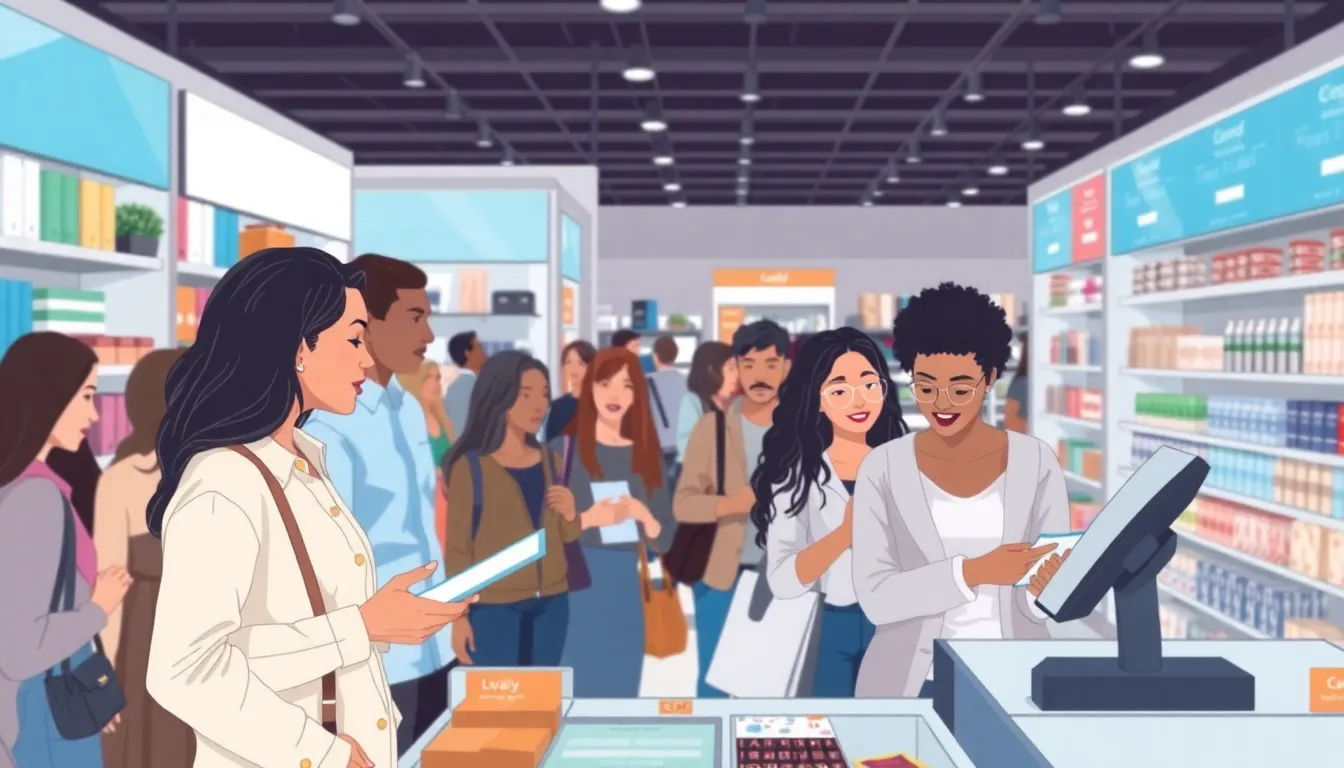In the bustling world of retail, where every sale counts and customer loyalty is worth its weight in gold, mastering customer relationship management (CRM) is no longer a luxury; it’s a necessity. Retailers face a daily challenge: how to turn casual shoppers into devoted fans. It’s a bit like dating—first impressions matter, and no one wants to be ghosted after a great first date.
Table of Contents
ToggleUnderstanding Retail Customer Relationship Management
Retail customer relationship management (CRM) focuses on strategies that improve interactions between retailers and their customers. It enables personalized experiences by collecting and analyzing customer data. Techniques such as tracking purchase history, preferences, and feedback help retailers understand customer behavior.
Improving customer loyalty relies on utilizing this data effectively. Retailers can segment their customer base and tailor marketing campaigns towards specific groups. Personalized promotions based on individual behaviors increase engagement rates. Targeting customers with relevant offers fosters a sense of value.
Leveraging technology, CRM systems aid in streamlining communication. Retailers utilize these systems to provide timely customer support and respond to inquiries efficiently. Engaging with customers across multiple channels enhances satisfaction. For instance, using social media platforms, email, and mobile applications allows retailers to connect where customers feel comfortable.
Developing relationships with customers encourages repeat business. Strategies like loyalty programs cultivate long-term engagement. Retailers can reward frequent shoppers with exclusive offers, thereby motivating them to return.
Successful implementation of CRM also includes understanding customer feedback. Taking action based on insights gained from surveys or online reviews helps in refining product offerings. Regularly updating customers on changes demonstrates a retailer’s commitment to improvement.
Investing in CRM tools impacts overall sales by fostering a more profound connection with customers. It streamlines processes, enhances service quality, and ultimately leads to increased profitability. By focusing on understanding and meeting the needs of customers, retailers turn casual shoppers into loyal brand advocates.
Importance of Retail Customer Relationship Management

Retail customer relationship management (CRM) plays a vital role in connecting brands with their customers. Emphasizing personalized interactions cultivates loyalty and drives sales.
Enhancing Customer Experience
Retailers enhance customer experience by utilizing personalized data insights. Understanding individual preferences allows them to tailor shopping journeys. Interactive communication through various channels creates a seamless experience. Quick response times to inquiries foster satisfaction. Streamlined processes encourage positive shopping outcomes. Effective management of customer interactions leads to higher retention rates.
Building Customer Loyalty
Building customer loyalty stems from consistent engagement and trust. Loyalty programs offer incentives for repeat purchases, encouraging long-term relationships. Personalized marketing messages resonate more, making customers feel valued. Retailers who gather and act on feedback show commitment to improvement. Establishing emotional connections turns shoppers into advocates, promoting word-of-mouth referrals. Fostering a brand community strengthens loyalty by encouraging shared experiences.
Strategies for Effective Retail Customer Relationship Management
Effective retail customer relationship management (CRM) requires a combination of targeted strategies to build strong connections with customers.
Personalization Techniques
Creating personalized experiences enhances customer loyalty. Retailers can analyze purchase history and preferences, which enables them to tailor marketing messages that resonate with individual shoppers. Segmenting customers based on demographics or buying patterns allows retailers to craft specific offers and recommendations. Incorporating personalization into communication results in a higher engagement rate, as customers feel valued and understood. Rewarding loyal customers with exclusive discounts or personalized gifts fosters emotional connections and promotes repeat business.
Utilizing Technology and CRM Systems
Embracing technology is vital for modern retail CRM. Implementing robust CRM systems streamlines interaction while offering valuable insights into customer behavior. These systems can automate communication, ensuring timely responses through multiple channels like email or social media. Data analytics tools assist retailers in visualizing trends and customer preferences, making it easier to adjust strategies accordingly. Moreover, integrating CRM with inventory management helps ensure that customer expectations are met, enhancing the overall satisfaction of shopping experiences.
Challenges in Retail Customer Relationship Management
Retail customer relationship management (CRM) faces several challenges that can hinder its effectiveness. Two significant challenges include data privacy concerns and integrating multiple channels.
Data Privacy Concerns
Data privacy stands as a primary concern for retailers today. Customers increasingly value their personal data protection and expect retailers to respect their privacy. Compliance with regulations, such as the General Data Protection Regulation (GDPR), requires retailers to implement strict data handling practices. Failing to safeguard customer information can result in legal repercussions and erode customer trust. Addressing these concerns involves transparent communication about data usage and prioritizing security measures to protect sensitive information.
Integrating Multiple Channels
Integrating multiple channels presents another significant obstacle in retail CRM. Retailers communicate with customers through various platforms, including brick-and-mortar stores, websites, and mobile apps. Creating a seamless experience across these channels is essential for effective customer engagement. Disjointed communication leads to confusion and dissatisfaction. Retailers must adopt centralized CRM systems that unify customer interactions. This integration streamlines processes, allowing better tracking of customer journeys and ensuring consistent messaging across all touchpoints.
Retail customer relationship management is crucial for building lasting connections with consumers. By leveraging data insights and technology, retailers can create personalized experiences that resonate with individual shoppers. This not only enhances customer satisfaction but also fosters loyalty and encourages repeat business.
As the retail landscape continues to evolve, embracing effective CRM strategies will be key to navigating challenges such as data privacy and multi-channel integration. Retailers that prioritize customer relationships will not only improve service quality but also drive profitability. Ultimately, a strong CRM approach transforms casual shoppers into devoted brand advocates, ensuring long-term success in a competitive market.







